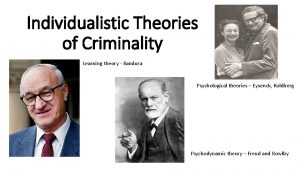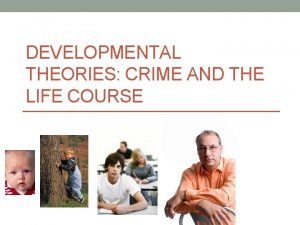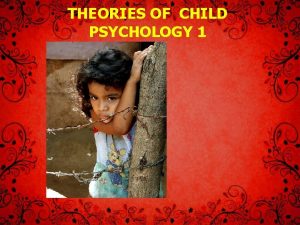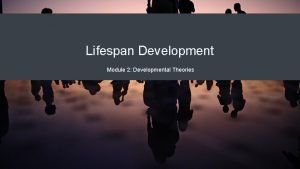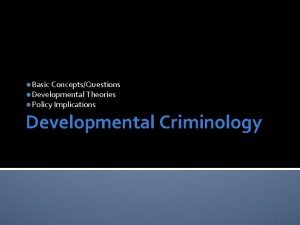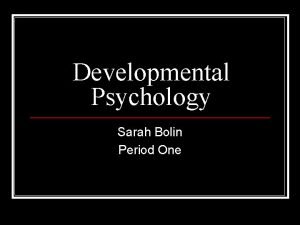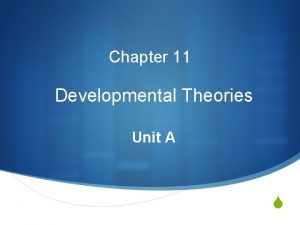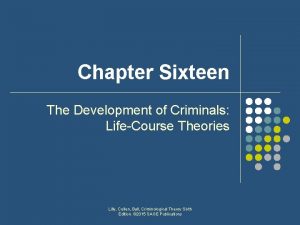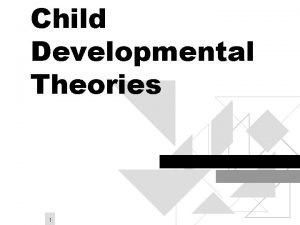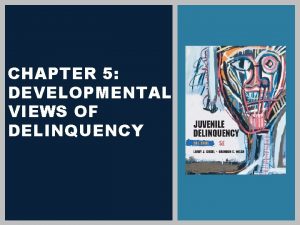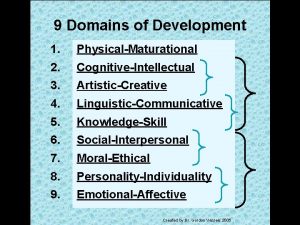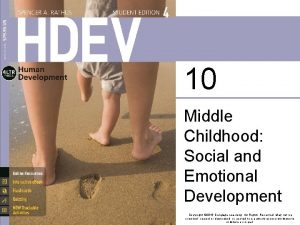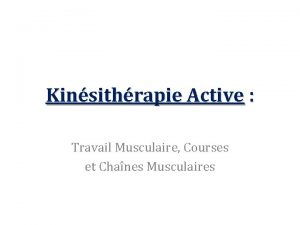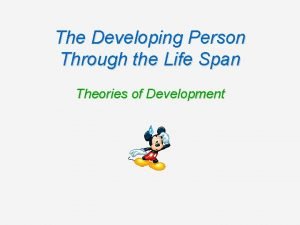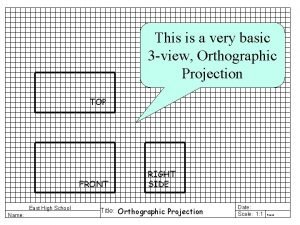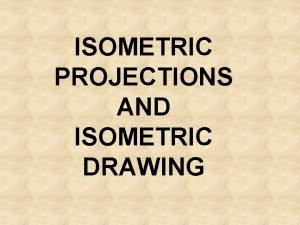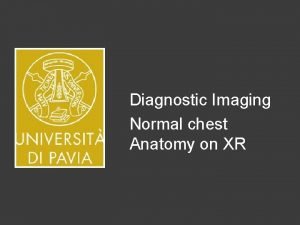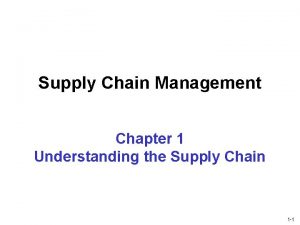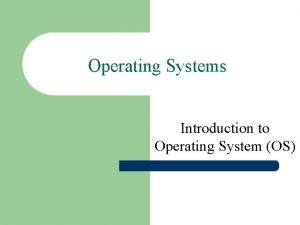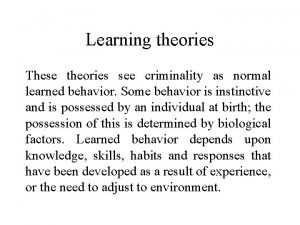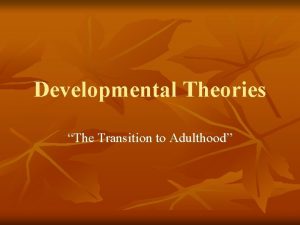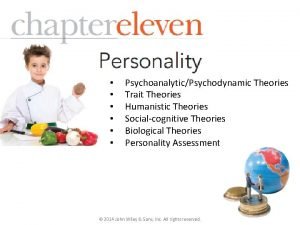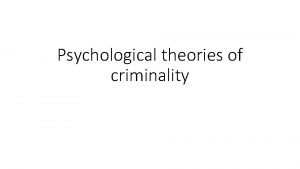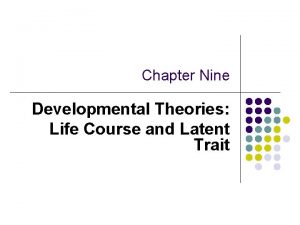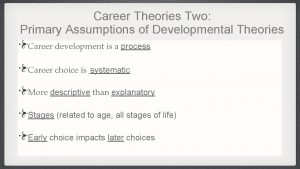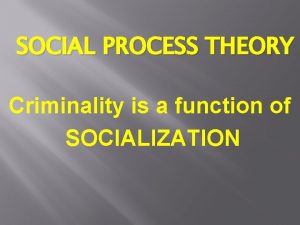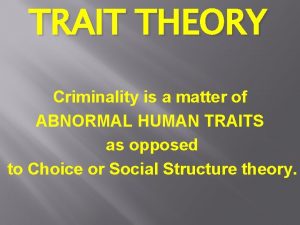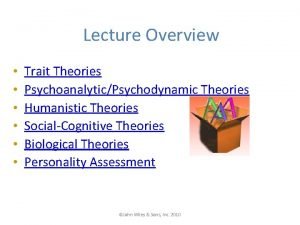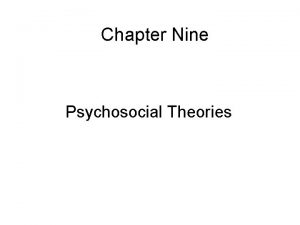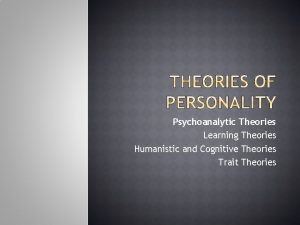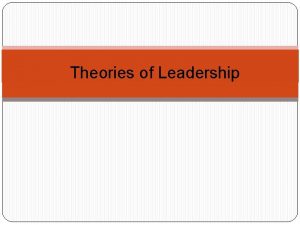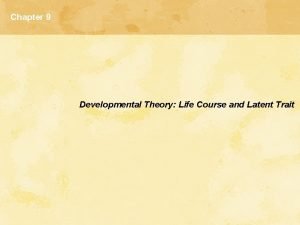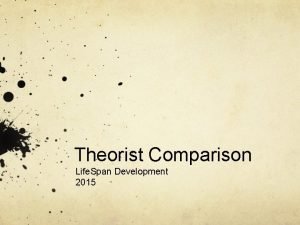DEVELOPMENTAL THEORY Life Course Theories View criminality as


































- Slides: 34

DEVELOPMENTAL THEORY Life Course Theories View criminality as a dynamic PROCESS. Look at the ONSET, CONTINUATION & TERMINATION of criminal behavior.

Developmental Theory Consider SOCIAL experiences as well as INDIVIDUAL characteristics.

Developmental Theory Look at DEVELOPMENTAL factors including BIOLOGICAL, SOCIAL, & PSYCHOLOGICAL.

Developmental Theory Rolf Loeber & Marc Le Blanc (1990) It is important to study the development of a criminal career. (Beginning, middle & end)

Developmental Theory Latent Trait Theory (also called Propensity Theory) Human Behavior is controlled by a MASTER TRAIT present at birth or shortly thereafter.

Developmental Theory Latent Trait Theory – cont. External forces such as interpersonal Interactions & criminal opportunity interact with the MASTER TRAIT to direct criminal behavior.

Developmental Theory Latent Trait Theory – cont. People DO NOT change their FUNDAMENTAL NATURE.

Developmental Theory Problem Behavior Syndrome - (PBS) Wraparound Approach Criminality should be viewed as one of MANY SOCIAL PROBLEMS faced by at risk youth.

Developmental Theory Problem Behavior Syndrome - (PBS) Cont. Interrelated behaviors may include: Family Dysfunction Sexual & Physical abuse Sexual Promiscuity Early Pregnancy School Problems Suicide Unemployment

Developmental Theory Pathways to Crime (Rolf Loeber 1998) 1. Authority Conflict Pathway (Begins early with stubborn behavior & defiance)

Developmental Theory Pathways to Crime (Rolf Loeber-1998) Cont. 2. Covert Pathway Begins with “underhanded” behavior (lying or shoplifting. ) Leads to property damage (fire setting & theft)

Developmental Theory Pathways to Crime (Rolf Loeber-1998) Cont. 3. Overt Pathway Begins with minor aggression & leads to physical fighting & violent crime.

Developmental Theory SPECIALIZATION Criminals who specialize by limiting their crimes in clusters. (EX. - Theft offenses like burglary or larceny or Violent offenses like assault & rape)

Developmental Theory GENERALIZATION Criminals who commit a variety of different kinds of crime.

Developmental Theory AGE Life Course Theories Assume that the seeds of criminality are planted early. Deviance is evidenced in Pre School.

Developmental Theory AGE - Cont. Begins with lying, stealing & cruelty to animals. The EARLIER the onset, the LONGER the duration.

Developmental Theory Terrie Moffitt (1993) Adolescent Limited Offenders Typical Teenager Rebellion Minor scrapes with the law Reduce their offending by age 18

Developmental Theory Terrie Moffitt - Cont. Life Course Persisters Begin offending early & continues into adult life. Family dysfunction & severe neurological problems present.

Developmental Theory Terrie Moffitt Life Couse Persisters – Cont. Maternal drug abuse, poor nutrition, or exposure to toxic agents like lead are typical.

Developmental Theory LIFE COURSE THEORY combines: Personal Factors Socialization Factors Cognitive Factors Situational Factors

Developmental Theory Life Couse Theories are INTEGRATED Theories. They weave SOCIAL & INDIVIDUAL variables into a chain to explain criminal behavior. They look at the TRAJECTORY of criminality & why & how it changes over a LIFETIME.

Developmental Theory Robert Sampson & John Laub (1993) TURNING POINTS Life events that alter the development of a criminal career. Ex. Marriage & Career

Developmental Theory Robert Sampson & John Laub (1993) Cont. SOCIAL CAPITAL Positive relations with individuals & institutions that are life sustaining. A good marriage Joining the military A career

Developmental Theory Rowe, Osgood & Nicewander (1990) LATENT TRAIT THEORY Latent traits explain the FLOW of crime over the life cycle.

Developmental Theory Latent Trait Theory - Cont. People have a personal attribute or characteristic that controls their inclination to commit a crime. Present at birth or shortly thereafter.

Developmental Theory Latent Trait Theory - Cont. Latent traits include: Defective intelligence Damaged or impulsive personality Brain function impairment Environmental influences on the brain (drugs, chemicals, injuries)

Developmental Theory Latent Trait Theory - Cont. Regardless of gender or environment, those who have one of these traits are AT RISK of becoming criminals. Those who don’t are at LOWER RISK.

Developmental Theory GENERAL THEORY OF CRIME (GTC) Michael Gottfredson & Travis Hirschi (1990) Considers the offender & the criminal act separately. Criminal acts occur when offenders perceive them to be advantageous.

Developmental Theory GENERAL THEORY OF CRIME (GTC) Belief that crime is a rational choice. Given the OPPORTUNITY crime prone people are more likely to commit crimes.

Developmental Theory GENERAL THEORY OF CRIME (GTC) The propensity to commit crimes is stable throughout ones life – only OPPORTUNITY changes.

Developmental Theory GENERAL THEORY OF CRIME (GTC) Adds a BIO SOCIAL element to crime. Poor parenting & lack of socialization affect NEURAL pathways. The brain establishes a pattern of electrochemical activation that remains for LIFE.

Developmental Theory GENERAL THEORY OF CRIME (GTC) Crime & LOW SELF-CONTROL are linked. People with low self control are impulsive, risk takers, shortsighted & insensitive to others. Males have less self control – thus higher crime rate.

Developmental Theory GENERAL THEORY OF CRIME (GTC) Poor self control is caused by inadequate PARENTING. Begins early in life & is stable throughout adulthood. Weak bonds with society.

Developmental Theory has resulted in a MULTI – SYSTEMIC treatment approach. Personal, social, education, family services, etc. are ALL provided. Wraparound Concept
 How do life course theorists view criminality?
How do life course theorists view criminality? The view that criminality is a dynamic process
The view that criminality is a dynamic process James bulger case social learning theory
James bulger case social learning theory Developmental criminology
Developmental criminology Ego centerism
Ego centerism Developmental theories
Developmental theories Developmental theories
Developmental theories Developmental theories
Developmental theories Chapter 11 developmental theories
Chapter 11 developmental theories Analyse situations of criminality
Analyse situations of criminality Life course theory crime
Life course theory crime Skinner theory of child development
Skinner theory of child development Developmental views of delinquency
Developmental views of delinquency Havighurst theory
Havighurst theory Developmental theory
Developmental theory Flemish bond t junction
Flemish bond t junction Course title and course number
Course title and course number Course interne course externe
Course interne course externe A systematic statement of principles and generalizations
A systematic statement of principles and generalizations This orthographic view is directly above the front view
This orthographic view is directly above the front view Revolve section view
Revolve section view Broken out section
Broken out section Viewing plane line example
Viewing plane line example Worms eye view camera shot
Worms eye view camera shot End elevation plan
End elevation plan Isometric multiview drawing
Isometric multiview drawing For the view create view instructor_info as
For the view create view instructor_info as Simple view and complex view
Simple view and complex view Simple view and complex view
Simple view and complex view Simple view and complex view
Simple view and complex view Partial view controller
Partial view controller X ray indication
X ray indication Cycle view and push/pull view of supply chain
Cycle view and push/pull view of supply chain Component of operating systems
Component of operating systems Separatist view of business ethics
Separatist view of business ethics


